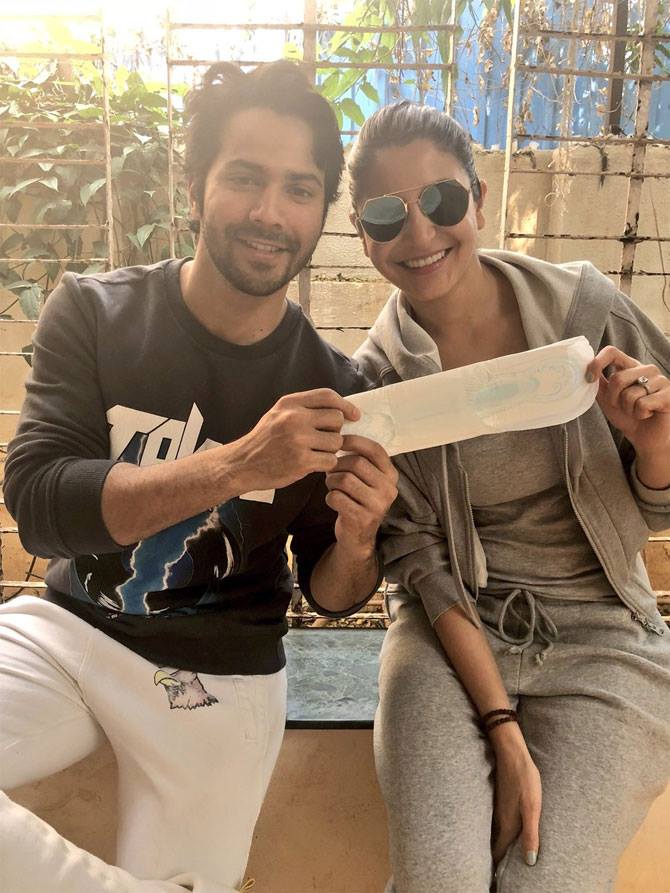For generations, a woman’s monthly cycle has been obscured by a culture of silence around menstruation, that allowed misinformation and discriminatory traditions to perpetuate. In the 1990s, Shabana Azmi was the first mainstream cinema personality to draw attention to the urgency of making sanitary products easily available and the importance of supporting girls and women to manage their health and hygiene during menstruation.
More recently, the Hindi film Padman, starring Akshay Kumar and produced by Twinkle Khanna, is evidence that the subject of menstruation has decisively moved away from the wasteland of stigma, generating national attention and interest.
The makers of the film initiated the #PadmanChallenge, and images of celebrities and youth icons holding a sanitary pad flooded the internet.

This has further helped open up the conversation around menstruation.
The landscape analysis by Geertz et al., 2016, titled Menstrual Health in India, observes that of the nearly 355 million girls in India who have come of age, 71 per cent report having no idea about menstruation before their first period.
Girls have reported feelings of shock, anxiety, guilt and anger as the dominant feelings during menarche and nearly 70 per cent women say that their families cannot afford sanitary pads. In a 2016 report on menstrual health and sanitation ‘Dignity for Her’ by the NGO Dasra , it was found that 23 per cent girls drop out of school once they reach puberty.
Poor menstrual health management can have a negative impact on critical outcomes like empowerment, education, environment, physical and mental health and economic independence. In many communities, women are socially ostracised in the days of their period, their mobility is restricted, they are considered impure, and are not allowed to worship or enter the kitchen.
However, over the past decade, movements have been launched to destigmatise menstruation and combat discriminatory social and cultural practices.
Menstrupedia is a simple comic book that explains menstruation and the issues that surround it using an engaging narrative and illustrations. Organisations like Goonj and Eco Femme are also speaking out about sustainable menstruation by propagating the use of cloth pads and menstrual cups.
You may also like: 8 Low Cost And Eco Friendly Ideas Which Have Revolutionized Women’s Sanitary Hygiene In India
In rural Bihar and Madhya Pradesh, adolescent girls have come together in groups called Kishori Clubs where they advocate and push for social change. Menstruation and its implications on health and mobility are a recurring theme in these meetings. The girls have set up ‘sanitary napkin banks’ by pooling their resources and contributing at least one rupee a day, Rs 30 a month, to be able to afford sanitary napkins for group members.
Some might consider these developments incremental, but for those who bleed surreptitiously, for those who consider the sanitary napkin a luxury, and even those who have to drop out of school upon reaching puberty, these are enormous changes.
Now that girls and women are breaking out of the cultural and social stigma that not only limits their potential but also curtails their rights and freedom, it is time for policymakers to support them. Policies to improve menstrual health management are handled by multiple ministries.
Unfortunately, it is often listed as a smaller goal under larger objectives of improving health or education outcomes for women and girls, and rarely features as a priority.
Menstruation, however, is not the only sexual and reproductive health issue, especially for adolescents. There are other aspects of sexual and reproductive health such as access to contraceptive information and services, sexual behaviour and orientation, which are also weighed down by taboos and misconceptions. As we see it, the long overdue dialogue has been initiated. We need to empower adolescents and youth with access to menstrual health management, family planning services, and healthcare that is dignified and safe. With correct information that destigmatise these issues and a sensitive approach, adolescents can be empowered to realise their potential, be confident of their abilities and prepared to be part of a powerful future.
(Written by: Poonam Muttreja)
Like this story? Or have something to share?
Write to us: contact@thebetterindia.com
Connect with us on Facebook and Twitter.
NEW: Click here to get positive news on WhatsApp!
If you found our stories insightful, informative, or even just enjoyable, we invite you to consider making a voluntary payment to support the work we do at The Better India. Your contribution helps us continue producing quality content that educates, inspires, and drives positive change.
Choose one of the payment options below for your contribution-
By paying for the stories you value, you directly contribute to sustaining our efforts focused on making a difference in the world. Together, let's ensure that impactful stories continue to be told and shared, enriching lives and communities alike.
Thank you for your support. Here are some frequently asked questions you might find helpful to know why you are contributing?

